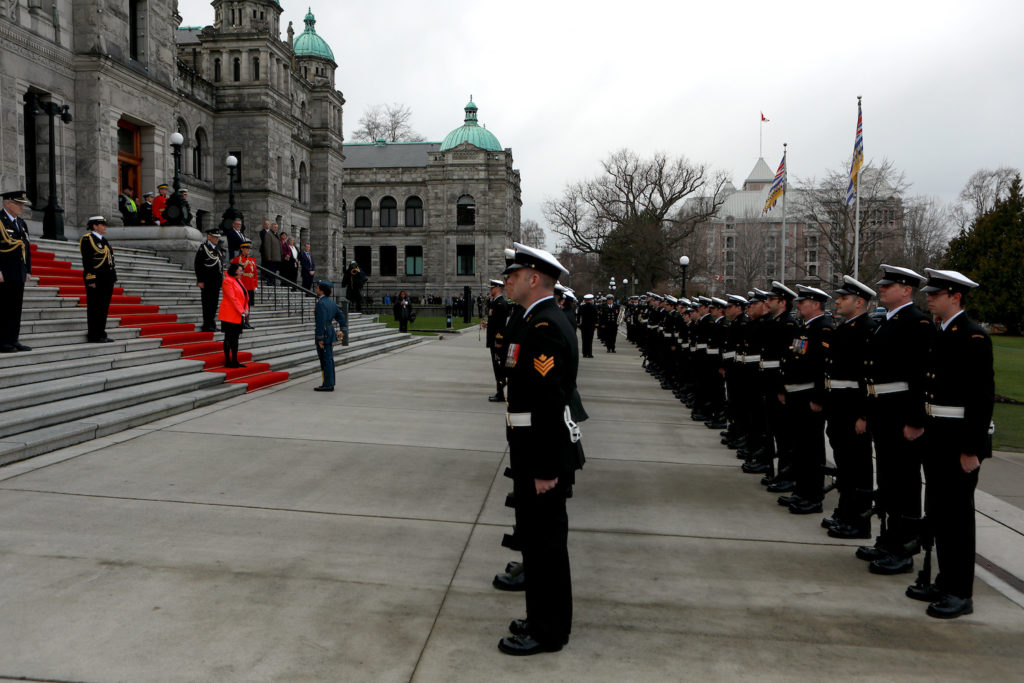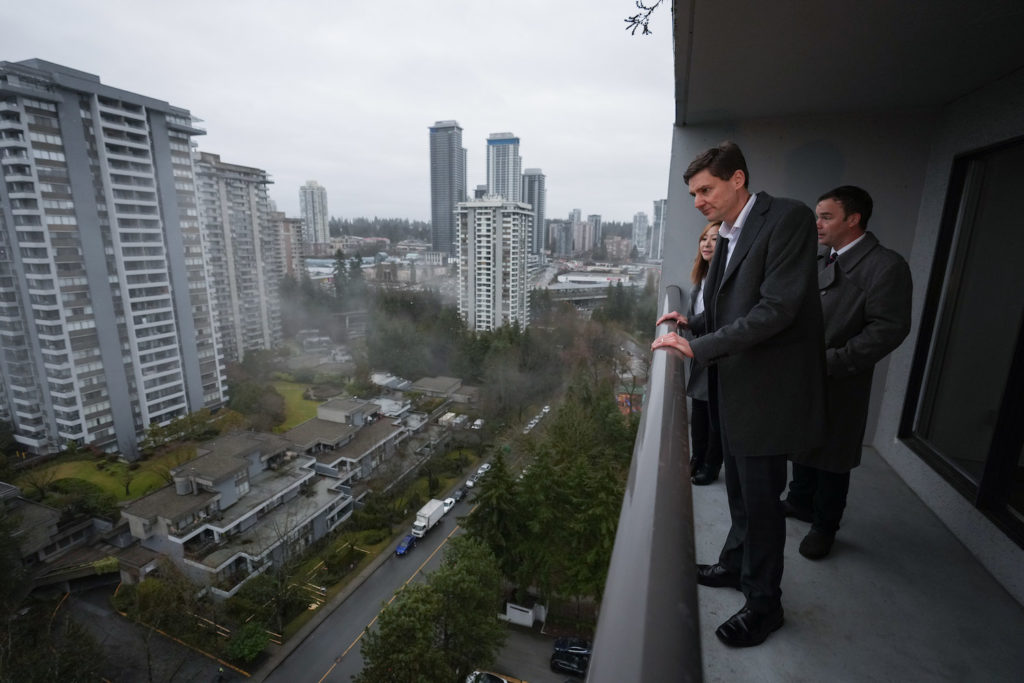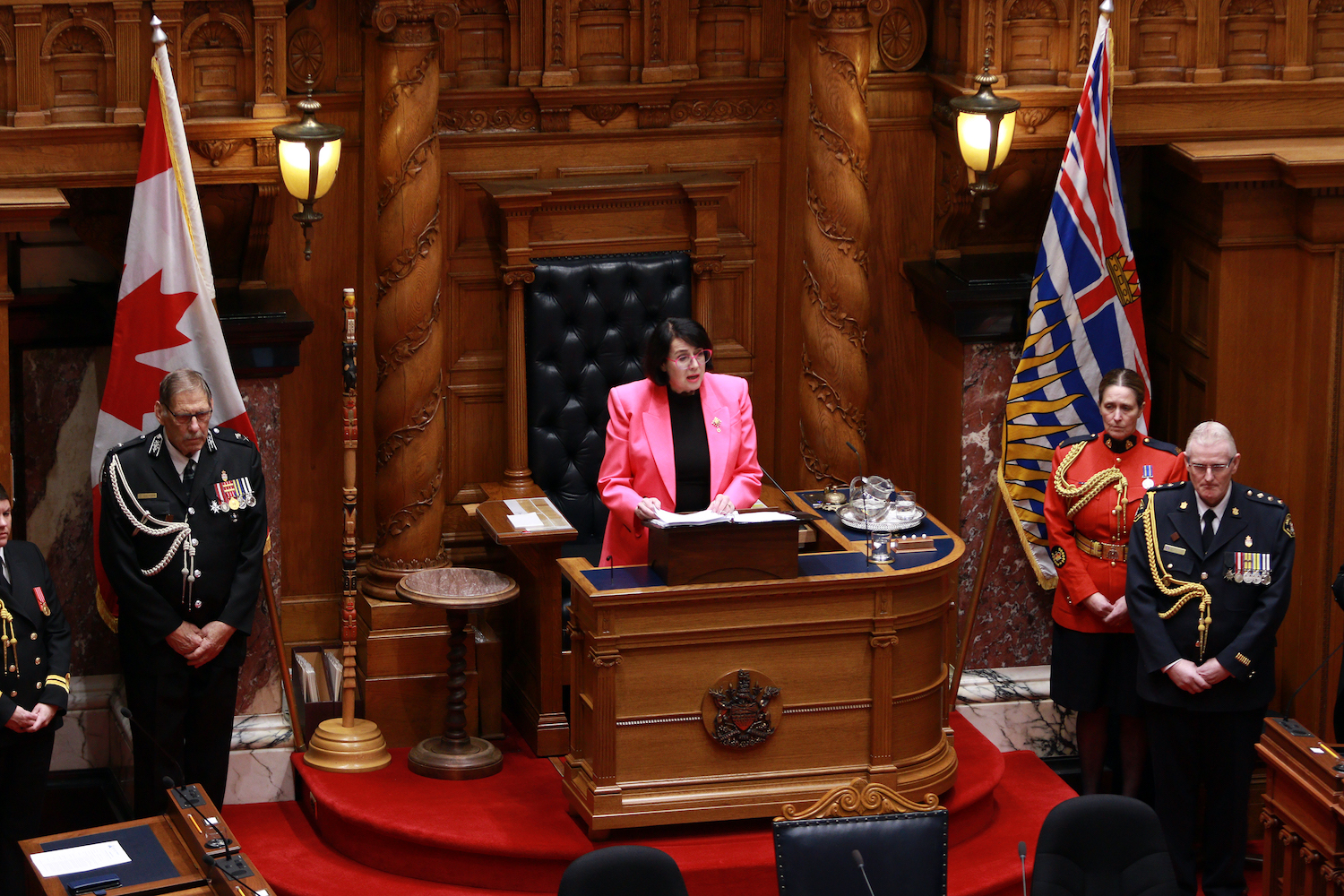The B.C. Legislature resumed this afternoon with a throne speech delivered by Lieutenant Governor Janet Austin. The spring session will run until May 11, 2023, and MLAs will return to Victoria for the fall session from October 3 to November 30, 2023. More than two dozen pieces of legislation are expected to be introduced throughout the 11-week session.
Having been sworn in near the end of the fall session, this legislative session is the first for new Premier David Eby. While Eby wasn’t present in the legislature for its delivery – he’s in Ottawa for health care meetings with his provincial counterparts – the throne speech was Eby’s first opportunity to formally lay out his plans for the next year. With just over a year and a half until the next scheduled provincial election in October 2024, Eby is under pressure to quickly make an impression with voters.
Health care, housing affordability, public safety, and climate change remain top priorities for the government. After his swearing-in in November, Premier Eby committed to 100 days of action to demonstrate progress in these four areas.
With global economic storms likely ahead, the speech from the throne had a consistent theme of policy development to address cost of living and access to housing, building on measures that were rolled out through the pandemic and in recent months. With public anxiety increasing as costs rise, continuing to roll out measures that address these growing concerns will be priorities for the remainder of this current mandate. The speech highlighted costs of food, gas and housing as primary concerns.
Eby’s first 100 days lead up to the February 28 delivery of the 2023/24 Budget, the first for new Finance Minister Katrine Conroy. In addition to pre-budget planning, the government is also working through decisions on allocations for the multi-billion-dollar surplus–generated in part by record revenues from taxes and the natural resources sector, something Eby acknowledged in the throne apeech. According to B.C. law, any unspent portion of the surplus at the end of the fiscal year (March 31) will expire and automatically go towards debt repayment. Budget 2023/24 is being described as a budget of ‘record investments.’

Throne speech
The throne speech is the government’s opportunity to shape the narrative leading into the legislative session and upcoming budget and provides some insight into what we can expect over the coming weeks.
The throne speech warned that with continued global economic pressures, B.C. is unlikely to have another significant surplus next year, reiterating their intent to spend the current surplus rather than direct it to debt repayment.
Opposition leaders Kevin Falcon and Sonia Furstenau each held media availabilities prior to the speech from the throne to outline their expectations for the session.
What we’re watching for
Healthcare at forefront of federal-provincial relations
Just last week, Premier Eby and select cabinet ministers travelled to Ottawa to meet with their federal counterparts. Their discussions focused on provincial priorities, including health care funding, housing needs, bail reform, and climate preparedness.
Tomorrow, provincial and territorial premiers will sit down with the prime minister for their much-anticipated meeting on increases to the Canada Health Transfer (CHT.) Leaving Ottawa last week, Eby told reporters he was “optimistic and hopeful” that a deal was on the horizon. Reports ahead of the summit in Ottawa indicate that the deal to be proposed by the federal government will see new money flow as soon as the next budget.
Once a deal is reached, provincial officials will quickly lose their ability to point to federal under-funding as a reason for the current health care crisis. Provinces are already under intense political pressure to show improvements in ER wait times, staff shortages, and family doctor attachment rates, and this will only escalate once a deal has been reached with Ottawa.
The speech delivered strong language on anti-privatization, while other Canadian jurisdictions make controversial moves toward private delivery. Bringing privatized health care workers back into the public system has been a key priority for Minister Dix, with the large-scale repatriation of workers in health facilities. The speech indicates their intention to continue on this path.
Collective bargaining between the B.C. Nurses Union and the Health Employers Association of B.C. is underway, in what’s expected to be a difficult negotiation process for the province.
Housing
Housing is expected to be a centerpiece of Eby’s governing agenda. Driven by Housing Minister Ravi Kahlon, the B.C. government plans to make “major new investments” to increase housing and services near public transit hubs around the province. They also plan to launch a refreshed housing strategy, which will be followed by new laws in the fall session.
Premier Eby has indicated a shift in housing policy to include middle-income as well as low-income earners, a departure from past government policy.
For added support, Eby has tapped Lisa Helps, former Mayor of Victoria, to serve as his special advisor on housing.

Economic growth and workforce development
Premier Eby has indicated that a strong and clean economy is a priority for his government as they head into the spring session.
The StrongerBC Economic Plan, released in February 2022, remains the government’s main economic policy roadmap, with planks like housing and cost of living measures being built around that overarching plan.
They have re-committed to introducing Future Ready, a skills-training action plan that will focus on education and training. The development of this plan was first announced in February 2022.
The government also plans to introduce a rural community strategy. This, paired with the recent introduction of a new parliamentary secretary focused on rural health, shows a focus from Eby on growth in non-urban regions of the province.
Eby has yet to outline his full vision for the energy and natural resources sectors, though today’s speech committed to making changes to the approvals process for natural resources projects–similar to what’s being done on housing permitting. Eby acknowledged the role the natural resources sector played in this year’s strong economic position, noting that “responsible management of our natural resources meant revenue set new records.”
Pre-election planning
With the next B.C. election set for fall of 2024, parties are beginning their preparations.
The B.C. Liberals (soon to be known as the B.C. United Party) have been performing better since Kevin Falcon assumed the leadership role last year. They are an opposition party united around their leader and are more organized and strategic in critiquing Premier Eby’s government. Falcon’s stump speech calls out the government for lack of results. Falcon is fond of saying, “the NDP mean well but it’s clear they simply have no idea how to move projects along and get results.”
Lately, the B.C. Liberals’ criticism has focused on British Columbia’s health care system, in particular support for mental health and additions. Last week, Falcon announced his plan to both overhaul the delivery of mental health services and build a recovery-oriented system of care for those suffering from addiction. In addition to investing in people with complex mental health needs, the B.C. Liberals commit to building an accessible, no-cost, recovery-oriented system of care for anyone struggling with addiction.
While the politicians are over in Victoria for the spring legislative session, the party apparatus is starting to prepare for the next election – developing policy and identifying candidates for unheld ridings.
The B.C. Green Party also recently started candidate nominations, having found themselves behind in 2020.
While speculation swirls in the capital about the next election coming earlier than the fixed date of October 24, 2024, Premier Eby maintains that he does not intend to call an early election.
The next election will be run on new electoral boundaries with the deadline for the final report and recommendations of the Electoral Boundaries Commission due to the legislature on April 3, 2023.
Throne speech highlights
On health care, the government promises to:
- Continue moving toward a historic agreement on health care funding with the federal government;
- Introduce a new model of addictions care, which moves people “seamlessly from detox to treatment and fills the gaps between services”;
- Invest in further expansion of treatment and recovery services; and,
- Continue its work to build BC’s health workforce and fight cancer with new investments to enhance access to screening and early detection, diagnostic imaging, and treatments.
On housing and affordability, the government promises to:
- Introduce new measures to address the cost of living, especially for those most vulnerable;
- Launch a refreshed housing strategy;
- Make “major new investments” to increase housing and services near public transit hubs around the province;
- Make “record investments” to support local governments in responding to the growth they are seeing in a way that makes our communities stronger and more liveable for families; and,
- Introduce new legislation in the fall 2023 session that will address policies for the refreshed housing strategy that will be launched in the months ahead.
On climate action and environmental protection, the government plans to:
- Expand our low-cost, clean energy potential through electrical generation and the promise of hydrogen;
- Introduce legislation to strengthen our ability to ensure polluters pay the cost of environmental cleanup on abandoned sites (first phase of consultation already complete);
- Introduce legislation to improve access to electric vehicle charging stations in condo buildings;
- Protect 30% of our land and water by 2030;
- Accelerate work on their plan to protect more of B.C.’s old-growth forests in partnership with First Nations rights holders; and,
- Work with First Nations, communities and stakeholders to help protect our watersheds.
On infrastructure, the government is committed to:
- Introduce a Rural Community Strategy to respond to the unique needs of a growing rural British Columbia;
- Continue working to connect every underserved community to high-speed internet by 2027; and,
- Introduce a new Emergency and Disaster Management Act to better improve B.C.’s ability to respond and recover from whatever might be in store.
On inclusive communities, the government plans to:
- Release data to help identify and address systemic discrimination and barriers in government programs and services as part of the Anti-Racism Data Act;
- Introduce pay transparency legislation;
- Introduce legislation to address the malicious and exploitative non-consensual sharing of intimate images; and,
- Continue implementing the United Nations Declaration on the Rights of Indigenous Peoples.
On public safety, the government is:
- Joining with all provinces and territories to press for urgent reforms to Criminal Code bail rules; and,
- Identifying proceeds from organized crime, tax evaders and lawbreakers as sources of funds to deliver on ‘strong community’ policy goals.
On workforce development and economic growth, the government plans to:
- Introduce the Future Ready Skills Plan;
- Apply changes being made to speed approvals for housing permits to other projects, including those in natural resources and tourism;
- Make trade missions to emerging markets a priority;
- Work with the forest sector to ensure a sustainable industry going forward to retool mills and manufacture value-added products, including those that replace plastics made from fossil fuels;
- Continue work to develop a Goods Movement Strategy that will ensure goods are moving as efficiently as possible so businesses can scale up;
- Work to remove unnecessary barriers to growth; and,
- Finalize a new ESG Centre of Excellence.
For more information on today’s Throne Speech, see the links below:
